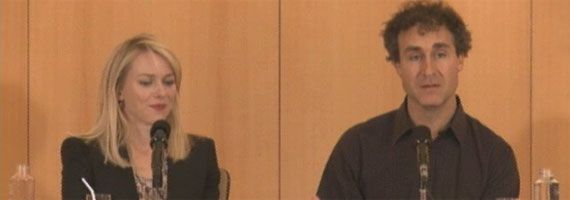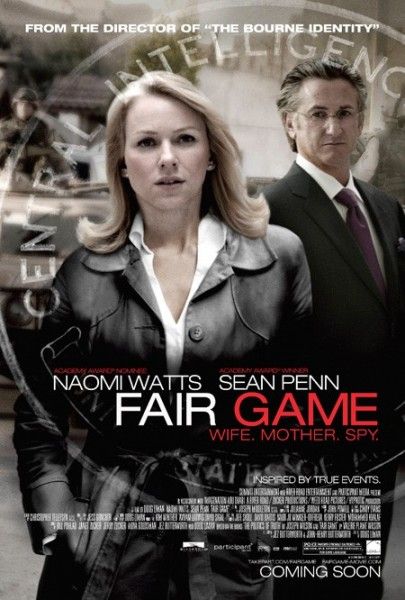A few weeks ago I got to participate in a press conference with Naomi Watts and Doug Liman's for their new movie Fair Game. Based on the outing of CIA agent Valerie Plame Wilson (Watts), the film also stars Sean Penn as her husband Ambassador Joseph Wilson. While I sort of knew their story before watching the film, Fair Game does an excellent job showing what both Wilson's were doing before the Bush administration compromised her status as a CIA agent. I really think after people see the movie, no matter if you're a Democrat or a Republican, there is no way you can excuse the administrations behavior for what they did to this family.
During the press conference (which Summit videotaped!), you can see Watts and Liman talk about making the movie, answer how involved was Valerie Plame, the politics of the movie, what changed after Cannes, and literally so much more it would be impossible to sum it up in an intro. Like we always do for video interviews, we've time indexed the entire 40 minute press conference so you can watch Watts and Liman answer the questions that interest you. Hit the jump for more:
Doug Liman and Naomi Watts
- :30 – Doug Liman talks about how factual Fair Game is (answer: very) and why he wishes Karl Rove would file a lawsuit against the film (answer: the press).
- 3:00 – Doug Liman discusses the apolitical nature of Fair Game. He states that it was the characters and story that attracted him to the film, not some political agenda.
- 4:30 – To Naomi Watts: What was it like playing Valerie Plame and what was Plame’s involvement with the film? Watts states that she felt an extra amount of pressure in playing a real person and discusses Plame’s role as a CIA consultant on Fair Game.
- 7:40 – Liman discusses bringing Valerie Plame’s story to the screen and the NOC (Non Official Cover) program that Plame was a part of.
- 9:50 – Liman talks about how Naomi Watts was his first choice to play Valerie Plame. He says that there has only been one other time when he got his first choice for a cast: Swingers
- 10:30 – Liman and Watts regale a story about their first meeting for the film. It involves baby nursing.
- 11:40 – What are the qualities of a political thriller that make it a classic? Liman states that the film must go beyond politics and instead speak to eternal truths.
- 13:10 – How does Liman balance Fair Game as a source for entertainment vs. for intellectual/emotional stimulation? Liman answers that he is first and foremost an entertainer.
- 15:26 - Naomi Watts discusses Valerie Plame’s character – very much a covert agent in person/not easy to read.
- 16:34 – Liman discusses avoiding any big typical Hollywood emotional scenes in Fair Game.
- 18:26 – How did Naomi Watts relate to Valerie Plame considering they are both mothers? Watts discusses balancing motherhood with her job.
- 20:31 – Considering Liev Schreiber (Watt’s husband) was also playing a spy in Salt, what was the home situation like between Watts and Schreiber as they were both preparing to play spies? Watts discusses doing research and comparing notes together.
- 21:25 – Did Liman tinker with the film after it played at the Cannes film festival? (answer: yes)
- 22:45 – Liman talks about how the focus of the film is the relationship between Valerie Plame and husband Joseph Wilson. He is most interested in what the effects of being a spy are on domestic life.
- 25:05 – What political relevancy does Fair Game have? Liman talks of the abusive power of the White House and how it is important to speak out against the powers that be during such a situation.
- 27:30 – How can Fair Game speak/connect to a polarized nation? Liman states that the film should speak to everyone regardless of his or her political affiliation.
- 29:20 – Liman responds to allegations that Valerie Plame was nothing more than a glorified receptionist (He states that this is simply not true.)
- 30:20 – How much did Naomi Watts know about Valerie Plame before coming on board the film? –Watts states that she was familiar with her story beforehand but that she learned most during the production of the film through research and meeting Plame.
- 32:10 – To Naomi Watts: What was it like meeting Valerie Plame? Watts says it took time to get to know her but after awhile she began to feel more comfortable with Plame.
- 34:18 – Watts and Liman discuss preparing for the film on a real CIA training ground/boot camp. Liman talks of being handcuffed in a trunk for an exercise whereas Watts talks of being kicked in the shins, thrown to the ground and told not to complain unless she had to go to the hospital.
- 38:00 – Did Plame ever speak about how she felt leaving her agents and their families in the open? Watts states that Plame loved her job and was justifiably upset about her public dismissal and its resulting aftermath
- 40:04 – What do Watt’s kids think of her profession as an actress? She states that they don’t quite understand her profession (regales a story about her upcoming film The Impossible during which she had to explain to her kids that her bruises were just makeup for the film.)
-


